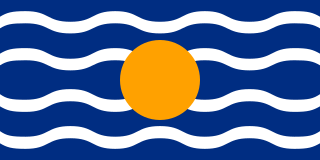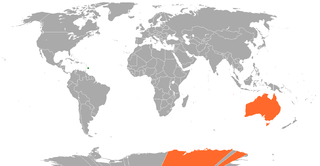Related Research Articles
The history of Trinidad and Tobago begins with the settlements of the islands by Indigenous First Peoples. Trinidad was visited by Christopher Columbus on his third voyage in 1498,, and claimed in the name of Spain. Trinidad was administered by Spanish hands until 1797, but it was largely settled by French colonists. Tobago changed hands between the British, French, Dutch, and Courlanders, but eventually ended up in British hands following the second Treaty of Paris (1814). In 1889, the two islands were incorporated into a single political entity. Trinidad and Tobago obtained its independence from the British Empire in 1962 and became a republic in 1976.

This article is about the demography of the population of Trinidad and Tobago including population density, ethnicity, education level, health of the populace, economic status, religious affiliations and other aspects of the population.

The Trinidad and Tobago Defence Force (TTDF) is the military organization responsible for the defence of the twin island Republic of Trinidad and Tobago. It consists of the Trinidad and Tobago Regiment, the Trinidad and Tobago Coast Guard, the Trinidad and Tobago Air Guard and the Defence Force Reserves.

The West Indies Federation, also known as the West Indies, the Federation of the West Indies or the West Indian Federation, was a short-lived political union that existed from 3 January 1958 to 31 May 1962. Various islands in the Caribbean that were part of the British Empire, including Trinidad and Tobago, Barbados, Jamaica, and those on the Leeward and Windward Islands, came together to form the Federation, with its capital in Port of Spain, Trinidad and Tobago. The expressed intention of the Federation was to create a political unit that would become independent from Britain as a single state — possibly similar to Canada, the Federation of Australia, or the Federation of Rhodesia and Nyasaland. Before that could happen, the Federation collapsed due to internal political conflicts over how it would be governed or function viably. The formation of a West Indian Federation was encouraged by the United Kingdom, but also requested by West Indian nationalists.

The British West Indies (BWI) were colonised British territories in the West Indies: Anguilla, the Cayman Islands, Turks and Caicos Islands, Montserrat, the British Virgin Islands, Antigua and Barbuda, The Bahamas, Barbados, Dominica, Grenada, Jamaica, Saint Kitts and Nevis, Saint Lucia, Saint Vincent and the Grenadines, British Guiana and Trinidad and Tobago. Other territories included Bermuda, and the former British Honduras.

Point Fortin, officially the Republic Borough of Point Fortin, the smallest Borough in Trinidad and Tobago is located in southwestern Trinidad, about 32 km (20 mi) southwest of San Fernando, in the historic county of Saint Patrick. After the discovery of petroleum in the area in 1906 the town grew into a major oil-producing centre. The town grew with the oil industry between the 1940s and 1980s, culminating in its elevation to borough status in 1980. After the end of the oil boom Point Fortin was hit hard by economic recession in the 1980s and the closure of its oil refinery. Construction of a Liquefied Natural Gas plant by Atlantic LNG in late 1990s boosted the economy.

Trinidad and Tobago, officially the Republic of Trinidad and Tobago, is the southernmost island country in the Caribbean. Consisting of the main islands Trinidad and Tobago and numerous much smaller islands, it is situated 11 kilometres off the coast of northeastern Venezuela and 130 kilometres south of Grenada. It shares maritime boundaries with Barbados to the east, Grenada to the northwest and Venezuela to the south and west. Trinidad and Tobago is generally considered to be part of the West Indies. The island country's capital is Port of Spain, while its largest and most populous city is San Fernando.
Anand Ramlogan is a member of the Bar of Trinidad and Tobago, England & Wales and the British Virgin Islands. He is the founder and head of Freedom Law Chambers which is based in the city of San Fernando, Trinidad. He served as junior counsel to the late Sir Fenton Ramsahoye QC in whose footsteps he followed to become the Attorney General of Trinidad and Tobago during the period 28 May 2010 – 2 February 2015. As Attorney General, he was also the titular head of the bar.
Roderick Saxon Snell is a British electronics engineer, born 1940, who co-founded Snell & Wilcox in 1973, working full-time for it from 1988. The company grew to about five hundred people in the late 1990s. Snell remained on the board during the period 2002-2008 when for financial reasons the company contracted, became part-time after that and left the new company in 2011.

Barbados–Guyana relations refers to the current and historical relationship between Barbados and Guyana. The former maintains non-resident diplomatic representation from Bridgetown, while Guyana which prior had a High Commissioner to Barbados appointed its first resident Consul-General, Michael Brotherson to Bridgetown in January 2012.

Barbados and Trinidad and Tobago formally established diplomatic relations on Barbados' national date of independence, 30 November 1966. Barbados maintains non-resident representation to Port of Spain, and the Republic of Trinidad and Tobago maintains non-resident representation to Bridgetown. Both countries are members of many shared organisations, including the Association of Caribbean States, the Commonwealth of Nations, CARICOM, CARIFORUM, and the Community of Latin American and Caribbean States.

Foreign relations exist between Australia and Barbados. Neither country has a resident ambassador. The regional Australian High Commissioner to Barbados is accredited from Port of Spain, Trinidad & Tobago. Barbados is represented in Australia through its High Commission in Ottawa, (Canada). Barbados maintains an honorary consul and a tourist office in Australia. Barbados and Australia established diplomatic relations on 7 January 1974. Both countries are members of the Commonwealth of Nations, and comprised as former parts of the British Empire.

Philip Louis Ulric Cross was a Trinidadian jurist, diplomat and Royal Air Force (RAF) navigator, recognised as possibly the most decorated West Indian of World War II. He is credited with helping to prevent some two hundred bombers from being shot down in a raid over Germany in 1943. He subsequently studied law at London's Middle Temple, and went on to fulfil a distinguished international career as a jurist across Africa and within Trinidad and Tobago. He also served as a diplomat for Trinidad and Tobago to the United Kingdom.

The Australian high commissioner to Trinidad and Tobago is an officer of the Australian Department of Foreign Affairs and Trade and the head of the High Commission of the Commonwealth of Australia in the Republic of Trinidad and Tobago. The position has the rank and status of an ambassador extraordinary and plenipotentiary and the high commissioner resides in Port of Spain. The high commissioner, since March 2023, has been Sonya Koppe.
Garvin Edward Timothy Nicholas is a Trinidad and Tobago politician and former diplomat. He served as a temporary Opposition Senator representing the United National Congress (UNC) in the 8th Republican Parliament and the 10th Republican Parliament. He was the Trinidad and Tobago High Commissioner to the United Kingdom from 2010 until 2013 and the Ambassador Extraordinary and Plenipotentiary for Trinidad and Tobago to Denmark, Finland, Norway, Sweden and Germany. He served as the Attorney General for Trinidad and Tobago from 3 February 2015 until 17 June 2015. He is the leader of the Movement for National Development (MND), a political party which contested the 2020 general election.

Wilfred Andrew Rose (1922–2008) was a Trinidadian and Tobagonian diplomat and politician who served in the Federal Parliament of the West Indies Federation from 1958 to 1962. A member of the People's National Movement, Rose also held several ambassadorial posts, most notably serving as Trinidad and Tobago's Ambassador to the United Kingdom from 1964 until 1968.
References
- ↑ "Birthdays". The Independent . 30 October 2014. Retrieved 15 June 2022– via Newspapers.com.
Arthur Snell, High Commissioner, Trinidad and Tobago, 39
- 1 2 "Change of British High Commissioner to the Republic of Trinidad and Tobago". gov.uk. Government of the United Kingdom . Retrieved 1 July 2017.
- ↑ "British High Commissioner Arthur Snell presents credentials". news.gov.tt. Government of Trinidad and Tobago . Retrieved 1 July 2017.
- ↑ Parveen, Nazia (22 February 2017). "Tony Blair attacks Daily Mail's 'hypocrisy' over suicide bomber". The Guardian . Retrieved 1 July 2017.
- ↑ "Companies House".
- ↑ "Salman Abedi's path to jihadism in Manchester began in Libya and ended bloodily in Britain". Sydney Morning Herald . 5 June 2017. Retrieved 1 July 2017.
- ↑ "China attempting elite capture in UK: Report".
- ↑ "Doomsday Watch with Arthur Snell". Patreon. Retrieved 22 September 2022.
- ↑ "Arthur Snell's Podcast Credits & Interviews | Podchaser". Podchaser.
- ↑ Snell, Arthur (2022). How Britain broke the world : war, greed and blunders from Kosovo to Afghanistan, 1997-2022. Kingston upon Thames. ISBN 978-1-912454-61-7. OCLC 1336403742.
{{cite book}}: CS1 maint: location missing publisher (link)